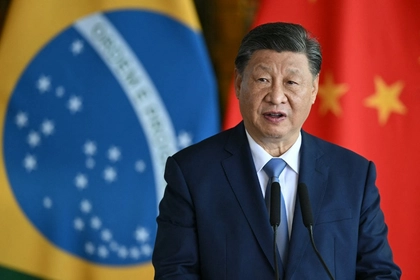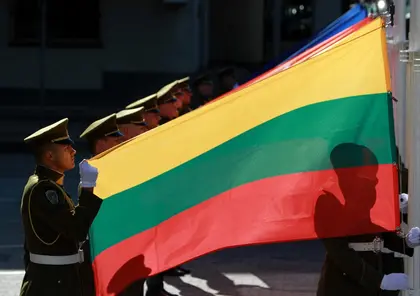Lithuanians vote Sunday in elections likely to deliver a change of government but keep much else the same, including the NATO and EU member's strong support for Ukraine and moves to bolster defense policy.
The vote is likely to see the center-left replace the ruling conservatives, and could also see a new populist party whose leader is on trial for alleged anti-Semitic comments enter parliament for the first time.
JOIN US ON TELEGRAM
Follow our coverage of the war on the @Kyivpost_official.
The Baltic state of 2.8 million people has been warily eyeing perceived threats from neighboring Russia, fearing it could be the next target if Moscow were to succeed in its ongoing war against Ukraine, which began in 2022.
Lithuania's main parties all agree on the need for strong support for Ukraine and to maintain or increase defense spending, currently around 3% of GDP.
Opinion polls show the Social Democratic Party, which last led the government from 2012 to 2016, ahead of 14 other parties and coalitions, with the latest survey predicting they will secure around 20% of the vote.
The ruling center-right Homeland Union-Lithuanian Christian Democrats are expected to receive around 15%, with six or seven parties likely to cross the electoral threshold in total.
Despite the potential change in government, no major changes in foreign policy are anticipated.
"There is no real alternative to what Lithuania chose 20 years ago," political analyst Linas Kontrimas told AFP, referring to the country joining the European Union and North Atlantic Treaty Organization.

China Wants to See US, Russian Nuclear Disarmament Efforts Before Talks
President's backing
President Gitanas Nauseda, who was re-elected for a second term this May with backing from the Social Democrats, is believed to support a change in government.
During the campaign, Nauseda – who defeated current Prime Minister Ingrida Simonyte in the presidential vote – met with leaders of all parliamentary parties except the conservatives, who have been in frequent conflict with him during their four-year term.
"I voted for the authorities to work together, not against each other, to solve the problems of the Lithuanian people," Nauseda said after casting an early vote, although he did not reveal his party preference.
Other opposition parties have united against the ruling conservatives.
"The time of the conservatives is over," Social Democratic leader Vilija Blinkeviciute, a former social security and labor minister, told reporters.
The Social Democrats have pledged to increase progressive taxation, tax luxury goods and provide additional funding for social services, as well as cut taxes for families with children, raise pensions and offer VAT relief on food.
Anti-Semitism concern
The election has also been marred by controversy surrounding a new populist party, Nemunas Dawn, led by former long-time MP Remigijus Zemaitaitis, which is expected to win parliamentary seats.
Last year, Zemaitaitis gave up his seat in parliament after facing criticism over alleged anti-Semitic comments.
He is currently on trial for incitement to hatred, although he denies the charge and insists he only criticized the Israeli government's policies in the Gaza Strip.
Most political parties have vowed to exclude Zemaitaitis from any ruling coalition.
"I think we are facing not only a geopolitical threat, but also an internal political threat," Foreign Minister Gabrielius Landsbergis, the leader of the conservatives, told reporters after he cast his early vote.
During World War II, 90% of Lithuania's Jewish population of approximately 208,000 were killed, often with the help of local collaborators, and the country's historical memory of the Holocaust remains a subject of intense debate.
The first round of Sunday's election will allocate roughly half of the 141 parliamentary seats through proportional representation, with the remaining seats to be decided in runoff rounds on October 27.
You can also highlight the text and press Ctrl + Enter










